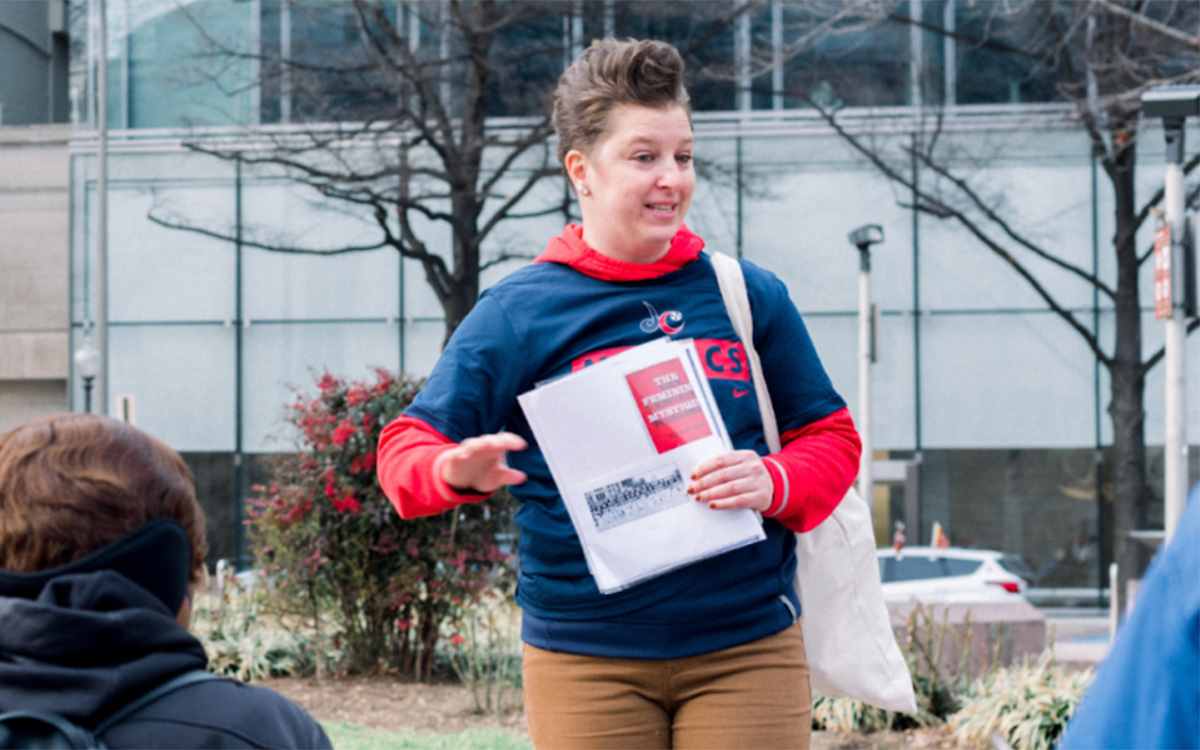Business
Tour guide Kaitlin Calogera bringing marginalized history to life
A Tour Of Her Own is first D.C. tourism company to focus on women’s stories

Kaitlin Calogera was a Washington, D.C. tour guide for five years but said she saw a need for tours centered on telling the stories of notable figures who don’t have a statue on the National Mall.
In 2018, Calogera started A Tour Of Her Own, the first tourism company in D.C. to focus on women’s history.
“Our tours are different than other tours, because we don’t only point out what’s right in front of you,” she said. “We also help you unlearn history and show you what’s not there.”
The tours A Tour of Her Own offers range from personal to private and even virtual tours. The public tour program entitled, “The Lineup”, includes four women’s history and culture events per month.
According to Calogera, a lot of tour guides are trained to shy away from talking about political topics to avoid offending anyone in the group.
However, Calogera says that at A Tour of Her Own they lean into politics and current events, without particularly “choosing sides.”
“What we try to do is share relevant, historical stories and then open it up for conversation so that the people in the group have a voice,” she said. “It is their tour as much as it is ours.”
In a recent tour, Calogera said she encountered a protest about reproductive rights between a religious and queer group. As the groups approached each other with chants and opposing signs, Calogera took a temperature check and decided to make the tense situation a learning moment.
“At that point, it’s my responsibility as a tour guide to show that this is democracy in action,” she said.
Calogera emphasized that her job is not just to yell and point at landmarks but to understand the city that she works in. She and her team know what a rally is supposed to look like and what it’s not.
They will analyze and ask for consent before proceeding into a heightened situation, but do not immediately turn away from conflict.
As a part of their analysis, they consider factors like whether or not people are keeping respectful distances, how police are interacting with the crowd and if people are beginning to get physically violent, before approaching protests.
“Those are all things that a tour guide has knowledge of because we know our city, we know how it functions, we know how it operates,” she said.
As Calogera looks to the future, she wants to expand A Tour Of Her Own to reach a broader audience.
“Students who go to school and their books are getting banned in libraries,” she said, “they’ll never have access to what feminist history or queer history looks like unless they leave their towns.”
Her goal is to find a way to bring people who don’t have access to marginalized histories to D.C. and give them the opportunity to learn.
“What I would like to see with A Tour Of Her Own is expanding access to the most vulnerable in our communities,” she said. “I want to be able to access people who are suffering from not only a lack of education – but a deliberate attack on it.”
Business
New owners of Color Lab Salon by TSR have big plans
Fresh outlook, expanded services planned at Connecticut Avenue facility

Thomas Shelton, Sandy Campbell, and Rick Baker are the new owners of Color Lab Salon by TSR, formerly known as VSL Harlow.
They have given the salon a new name and outlook in hopes of getting the shop back to its former glory.
“Fifteen to 20 years ago there were lines out of the door and it was the place to go in the community,” said Shelton “We want to get it back to that.”
Shelton and Campbell have been doing hair for more than 20 years. Shelton even worked at VSL Harlow shortly, before opening his own salon.
Baker is the only owner who doesn’t do hair but he can typically be found at the front desk of Color Lab.
When the former owners of VSL Harlow approached Shelton about taking over the salon he knew he couldn’t do it alone. So, he called Campbell and just a month later they were signing the lease to the building.
After some demolition work to update the space, Color Lab Salon was up and running.
In addition to Campbell and Shelton there are six other hairstylists, a waxer, nail tech, and threading artist.
This year they plan to add mani-pedis to their services, something that Campbell said he is really excited for.
“I figure if you offer all types of services people will always want to come,” said Campbell.
In addition to offering new services this year they are also implementing a new education system. Campbell and Shelton said that education and staying on top of trends in the hairstyling community will help to attract more customers.
“We want to be trendsetters and education is a big part of that,” said Shelton.
The Color Lab is open seven days a week at 1607 Connecticut Ave., N.W.
Business
A Workplace That Transcends the Ordinary
The Mather is hiring for an array of positions to provide hospitality and exceptional service.

When you start your workday, do you want to walk through the doors and enter an environment where talents are nurtured, passions are pursued, and possibilities abound? In Mather’s newest venture in Tysons, Virginia, all of this is part of an award-winning culture within their luxury community called The Mather.
The highest level of hospitality imbues The Mather’s elegant amenity spaces, thoughtfully curated food and beverage offerings, and innovative model of next-level service.
A Life Plan Community for those 62 and better, The Mather stands ready to welcome residents in early 2024, and is well underway with recruiting top talent who share a passion for creating an atmosphere that transcends the ordinary. That stems from the unique values of its parent organization—inclusive, resilient, bold, and impactful—and its vision to change the way society views aging. Mather, an 80+-year-old not-for-profit organization, has a history of retaining dedicated team members for years, by helping them learn new skills, develop their careers, and eliminate barriers to personal fulfillment.
Raj Radke, vice president and general manager of The Mather, explains, “Our mission of creating Ways to Age Well extends to all team members. We support their personal well-being with a supportive culture, valuable on-the-job perks, opportunities to learn and advance, and a competitive benefits package.” Highlights of that package include
- a generous paid time off program
- excellent medical and dental benefits
- tuition reimbursement
- annual reimbursement for self-care items and experiences
Benefits commence on the first of the month following 30 days of employment. On-site perks include complimentary use of the community’s fitness center and pool, free parking, and a free meal.
Located on Westpark Drive near Tysons Galleria, The Mather offers apartment homes ranging in size up to 3,300 square feet; luxury amenities include a fitness center featuring an exercise studio and indoor pool, multiple restaurants, a bar, outdoor event terraces with catering opportunities, a full-service spa, and three acres of green space. Services include reception and concierge, valet parking, shuttle and driver services, resident engagement and programming, housekeeping, and maintenance.
Mather, with three senior living communities in Illinois and Arizona, is certified as a Great Place to Work and received a Nation’s Best and Brightest in Wellness Award from the National Association for Business Resources five years in a row, for promoting employee well-being, worksite health, and wellness.
The Mather is hiring for an array of positions to provide hospitality and exceptional service; it ultimately will have a total of 100+ full- and part-time team members—all focused on creating unique opportunities and meaningful moments for residents, colleagues, and guests.
“We’re seeking team members from high-end hotels and resorts who share our dedication to making a difference and creating luxury experiences,” says Raj. “We’re building a team that will push the envelope in curating elevated engagements that embrace a vibrant culture for residents and team members alike.”
If you’re interested in joining the team at The Mather, or know someone who is, browse open positions at themathertysons.com/jobs.
Business
Dr. McKernan gives back while delivering Big Gay Smiles
Local dentist donates 10 percent of earnings to finding HIV cure

Robert McKernan was serving as a Mormon missionary for two years in college, working in the Dominican Republic. He said that the most gratifying work came as a translator for the Dominican Republic dentists.
“At the time, I was queer and closeted in this extremely religious community and I found dentistry to be exciting,” said McKernan.
So, when he returned to the United States he decided to pursue dentistry and has been giving people a smile they love for more than three years now.
After graduating from Touro College of Dental Medicine, he moved to D.C. and worked as an associate dentist for two different practices, before landing at Whitman-Walker Health.
Then, in 2021, he founded Big Gay Smiles. At his practice they aim not to, “treat patients like numbers, but family.”
Opening a practice during the COVID-19 pandemic was quite a journey, he said.
“We went from one chair in a rented dental office, to owning and purchasing our own commercial space and being open five days a week,” McKernan said.
In the new year, McKernan said Big Gay Smiles will welcome another dentist.
After coming out, McKernan was excommunicated from the Mormon Church. However, one of the values he hasn’t relinquished is the 10 percent tithe.
In the Mormon Church, congregants dedicate 10 percent of the their occupational earnings to the church.
So, when McKernan opened Big Gay Smiles, he made a commitment to donate 10 percent of its profits to finding a cure for HIV.
“Serving the community has always been a passion of mine,” McKernan said. “It’s just my life’s calling, I want to help people smile and find a cure for HIV by doing it.”
In addition to practicing at Big Gay Smiles, he still works full time at Whitman-Walker’s Max Robinson location. He is the only dentist there and primarily serves patients living with HIV.
If McKernan could tell his younger, closeted self anything it would be that things get better.
“You think that getting found out is the end of the world. It really isn’t, you know, it’s really just the beginning,” said McKernan. “You really enter into a second life that you live when you come out and live visibly.”



















